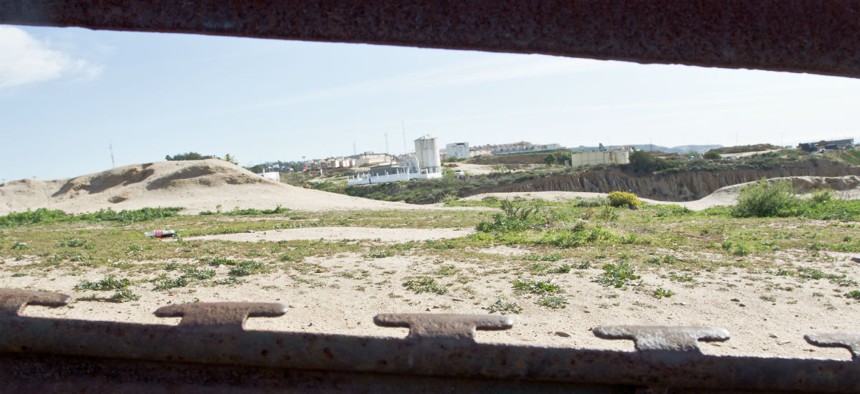
The view across the border into Tijuana, Mexico. Josh Denmark/CBP file photo
Homeland Security Watchdog Takes on Issues Surrounding Trump's Wall
IG will examine past efforts on Southern border, delays in hiring.
With President Trump continuing to talk up his long-promised wall across the border with Mexico, the Homeland Security Department’s inspector general on Wednesday unveiled a multi-pronged plan to examine obstacles to securing the Southern frontier.
John Roth took the opportunity at a Senate Homeland Security and Governmental Affairs Committee hearing on the government’s programs most at risk of waste and abuse to announce several coming audits prompted by the new administration’s domestic security agenda.
He also spoke five days after a DHS document leaked to the Reuters news agency suggested that building a 1,250-mile southern wall by the end of 2020 could cost $21.6 billion, or nearly twice previous estimates, and would be inhibited by mountainous terrain along the route. (DHS would not verify the new estimate, but Trump immediately tweeted that he would use the same jawboning techniques he’s used in seeking to reduce the price of major military aircraft built by contractors to cut the wall’s price as well.)
Roth told senators during testimony on strengthening Homeland Security’s management functions that his team will prepare backgrounders related to Trump’s executive order Border Security and Immigration Enforcement Improvements, and the “importance of spending [investments on the border] efficiently and effectively.”
Roth noted that DHS “has historically performed very poorly in this area," citing the electronic wall SBInet along the 53-mile Southwest border that cost $1 billion and was cancelled in 2011. “Given the risks involved, we will be using a lifecycle approach to audit and monitor the department’s actions to strengthen the physical security of the nation’s southern border,” he added. “A lifecycle audit approach means that we will be auditing the project throughout its life span, rather than waiting for the project to be completed or partially completed before looking at it. In this way, we have an opportunity to stop waste and mismanagement before the money is spent, rather than simply identifying it after the fact.”
His first report is expected within six weeks.
Then the IG’s auditors will review “Customs and Border Protection’s comprehensive study of the security of the southern border that the executive order requires be completed within 180 days.” Future audits will address the planning, design, acquisitions, and construction phases of the southern border barrier, according to Roth.
Trump’s order that DHS hire 5,000 new Border Patrol agents and 10,000 immigration officers came after Roth’s office had only recently completed a study of obstacles and bottlenecks that slow hiring. “We found that historically DHS components had insufficient staffing in the human resource area and had inadequate systems to track and process applicants,” he testified. “In fiscal 2015, it took an average of 282 days (over nine months) to hire a Border Patrol agent, measured from the time the job announcement closed to the date the applicant was hired. Other positions likewise encountered significant delays.”
IG auditors will also examine the “department’s human capital strategies and management capabilities to ensure the department can quickly and effectively hire a highly qualified and diverse workforce,” having previously identified “poor management practices and their negative impacts.” Later reviews will probe the impacts of the hiring of 15,000 on other agencies, Roth said.
Finally, the IG, as announced early this month, is also responding to Trump’s controversial order “Protecting the Nation from Foreign Terrorist Entry into the United States,” currently stayed by several courts following nationwide protests. “The review is being initiated in response to congressional requests and whistleblower and hotline complaints,” Roth said, adding that it will include an investigation into the order’s rollout—considered chaotic by many—as well as “DHS’ adherence to court orders and allegations of individual misconduct on the part of DHS personnel.”
NEXT STORY: Congress and Trump Won't 'Terminate the EPA'







